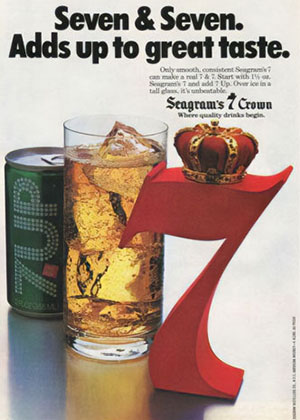 AUGSTINE HIMMEL
AUGSTINE HIMMEL
7 & 7
“How does it look?” asks Jakub, when I set his 7 & 7 on the bar in front of him.
“It’s perfect. Just the way you like ’em.”
“Does it sparkle?”
“Like true love,” I say, echoing a song playing on the jukebox.
“Yeah,” grins Jakub, his dark beard rising, “and the buzz lasts just about as long.”
I laugh, happy that as he sits there he can finally joke about his divorce, which had been traumatic for him and was followed by the onset of his blindness. Jakub comes from a devout Catholic family, and I know they’re one reason his divorce grieved him so much: He felt like he let them down. Plus, he’s just not the divorcing type. Helen was his high school sweetheart and he thought they’d be together forever.
“You didn’t put in too much whiskey? You know that spoils the color as well as the taste.”
“Take a drink and find out.”
I mix his 7 & 7s with precisely one-third Seagram’s and two-thirds 7UP from a can. My soda gun only has Coke products, and he doesn’t like his Seagram’s mixed with Sprite—and I don’t blame him. It doesn’t taste as good. There are other customers who request 7UP as a mix, though many don’t, especially among the younger crowd, I guess because they’re unaware it’s an option or they’re more interested in the high than the flavor. I’ll serve it any way they want, but as sure as my wife and I just paid off the mortgage on this place, 7UP makes a superior drink.
Jakub nods his approval, and then, while still holding the glass out in front of him, he adds, “Of all the things I miss seeing, the golden sparkle of a perfectly mixed 7 & 7 is near the top of the list. I swear, it used to be that looking at them was half the pleasure.”
“The only reason I look at a drink is to see if it’s full or empty.”
“But you drink beer.”
“Usually.”
“It’s not the same. I never paid much attention to a beer, either.”
“I’d give a beer some attention,” says Frank Shaw, who just walked in the side door and now stands next to Jakub at the short end of the L-shaped bar; he sports a blond horseshoe moustache, and teaches agriculture and science at Edson High.
“Budweiser?” I ask.
“Yeah,” he says, pulling out a high-backed stool and sitting down.
“How’s Frank tonight?” asks Jakub.
“Pissed off.”
“Why’s that?”
Frank scans the tavern to see who’s there, which, because it’s late on a Monday night, is only two couples at one table, and as I turn around, open a cooler door, reach down and get him a longneck, he says, “That damned Theilen!”
“Walt Theilen?” asks Jakub. “From the high school?”
“Yeah.”
“Why are you upset with Walt?”
“He took Briggs’ job as varsity basketball coach.”
“You’re joking,” says Jakub.
“He’s not joking,” I say, putting the bottle and a small glass in front of Frank.
“I thought he said he’d never take that job,” says Jakub.
“He did say that,” I agree. “All summer long.”
“Yeah, yeah…” says Frank. “He said he had the best girls’ program in the county, and he was happy with that. Said he didn’t want the bullshit that came with being the boys’ varsity coach. How many times did we hear that?”
“All summer,” I repeat, ringing up the beer.
“It really sickens me,” says Frank.
“Well…” says Jakub. “There must be a reason why he changed his mind.”
“There’s no reason to justify that,” says Frank. “All those years he was Briggs’ assistant coach… Sat side by side with him on that bench... If I was Briggs, I’d knock the hell out of him.”
I bring Frank his change and place it on the bar. “I’m surprised any teacher would want that job, after the way the school board treated Briggs—firing a winning coach just to satisfy some personal grudges.”
“Doesn’t Walt have a son in high school?” asks Jakub.
“Yeah,” says Frank. “Rodney… He’s a junior.”
“Maybe Walt wants to be his coach.”
Frank scowls, “Rodney isn’t much of an athlete. Even for Theilen, he’ll only be a benchwarmer.”
“Still,” says Jakub, “it’s something they can share… a father-and-son thing.”
“I can’t believe you’re sticking up for him,” says Frank.
“I’m not sticking up for him. I’m just saying there are reasons why people do what they do.”
“That might be, but Theilen’s still an asshole.”
Jakub shrugs, and I turn and walk down past the soda station to the opening at the top of the L-shaped bar, which is near the doorway to the kitchen, and go out and check on the lone table of customers. It’s true people always have a reason for what they do; bartend for a while and you’ll hear them justify the craziest things. I’m not Catholic, or even much of a churchgoer, but in the years I’ve had this tavern I’ve probably heard more confessions than most priests—although I neither absolve nor condemn, the latter of which would be bad for business. Besides, what would be the point? A man doesn’t need me to tell him he shouldn’t be poaching deer that eat the plants around his house, or he shouldn’t be leaving work early and having someone else punch his time card, or, even if his wife’s as cold as vodka from a freezer, he shouldn’t be diddling another woman. He already knows what’s right and wrong, and eventually he’ll learn there’s always a price to pay for his decisions.
I bring some empty bottles and glasses back behind the bar, and as I finish replacing them, Frank says to Jakub, “On top of everything, he stabbed a union brother in the back. You were a union man…”
“Still am,” says Jakub, who worked on an assembly line at Saginaw Steering Gear before macular degeneration destroyed his sight.
“Well, then, you should understand what a lousy thing that was to do.”
“I do understand. I’m just saying we can’t judge his motives.”
“Spare me your theology. I don’t give a fuck what his motives were.”
After I put the drinks on a tray and carry them to the table, return with the money, ring everything up and take back the change, I come behind the bar and go down to the short end of the L to check on Jakub and Frank, but Frank’s not there.
“You ready for another?” I ask Jakub, who’s now smoking a cigarette.
“Sure,” he says.
“Frank in the restroom?”
“No… He left.”
“That was quick.”
“I think I irritated him.”
“He was irritated when he came in.”
“Yeah,” sighs Jakub, “but I didn’t help things.”
“He’ll get over it.”
Jakub nods.
As I fill a clean glass with ice cubes, then Seagram’s, then 7UP from a can, I wish Frank had stayed, but I have to agree with him. It might be that Theilen wants to coach his son, which in itself is a good thing, but it doesn’t justify taking Briggs’ job. Just because you can do something, doesn’t mean you should.
I put a plastic stirrer in Jakub’s drink and carry it over to him. A couple months from now, in the Edson High gymnasium, Theilen will be sitting on the end of that bench where Coach Briggs used to be—and there’ll be something unsavory about it, like Seagram’s and Sprite.
© Augustine Himmel 2022
This story may not be archived, reproduced or distributed further without the author's express permission.
Please see our conditions of use.
Author Bio
 Augustine Himmel’s stories have been published in the Beloit Fiction Journal, the Blue Lake Review, the Long Story, the South Carolina Review, the Arizona Mandala, bananafish, the Bridge, Progenitor, the Rockford Review, the Northern Reader, and the Valparaiso Fiction Review. He’s placed essays in America Magazine, the National Catholic Register, and OnePeterFive.
Augustine Himmel’s stories have been published in the Beloit Fiction Journal, the Blue Lake Review, the Long Story, the South Carolina Review, the Arizona Mandala, bananafish, the Bridge, Progenitor, the Rockford Review, the Northern Reader, and the Valparaiso Fiction Review. He’s placed essays in America Magazine, the National Catholic Register, and OnePeterFive.
The Barcelona Review is a registered non-profit organization